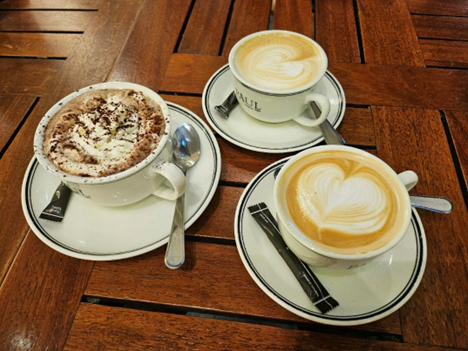
Sometimes you just need that caffeine hit and sometimes it’s not really about the coffee itself.
Beyond coffee and conversation, many cafés today also serve a social purpose, fostering inclusion and supporting meaningful causes. Take Agonista, Lebanon’s “inclusive coffee shops where people with Special Needs can thrive” or Sip & Sign, the new café in town “where people can grab their favorite drink or snack while learning how to communicate in sign language”. These cafés demonstrate how modern coffee shops are evolving: they are not just places to socialize, but also platforms for connection, raising awareness, and community engagement. In doing so, they exemplify a broader trend within the ‘experience economy’, where goods and services are designed as moments and experiences that people want to live and share, far beyond the coffee itself.
More generally, coffee shops have always been cultural and social hubs, but today’s cafés compete by becoming stylish, themed spaces. Niche cafés are a perfect example of that. The traditional corner café offered two things: caffeine and a place to sit. Today, cafés offer experiences that go beyond function: a board-game café turns lattes into playful interactions, a book café gives readers a quiet corner to lose themselves in stories, a “silent café” provides a space to focus outside the distractions of home… Coffee is the medium, but, in reality, the marketed product is the experience itself.
This evolution reflects larger cultural and economic trends. In saturated markets, where basic needs are already met, people increasingly search for meaning and identity through consumption. But even in less-saturated markets, consumers are drawn to cafés for fun, novelty, and the chance to participate in trends. Coffee is no longer just a drink but a marker of taste, lifestyle or even moral stance when requesting fair trade beans, vegan milk or specialty roasts signals something about the consumer. Cafés become stages for identity and businesses carefully invest in design, lighting, music, and events to maximize emotional engagement.
The economics behind it are simple yet powerful. Experiences are harder to compare than products. You can debate whether one espresso is cheaper than another but how do you compare the value of a themed café corner versus a quiet, minimalist space? This ambiguity allows some cafés to charge more because customers aren’t just buying coffee, they’re buying uniqueness. Moreover, experiences are memorable and shareable. Posting a photo from a themed café extends its reach, essentially turning customers into unpaid marketers.
At the same time, the rise of niche cafés illustrates how urban consumption patterns are evolving. In a world that often feels standardized and digital, people seek small escapes that feel personal. Paying extra for coffee might seem irrational, but it reflects a deeper desire to turn everyday life into something special, especially through the little things.
In short, niche cafés show how the experience economy operates at ground level. Value today is measured less in products and more in moments, moments we buy, live and often post online. But importantly, many modern cafés are proving that coffee can also be a vehicle for social impact, inclusion and community engagement. In a world full of choices, experience isn’t just a luxury, it can also be meaningful. And sometimes, people also simply love following the latest trends.